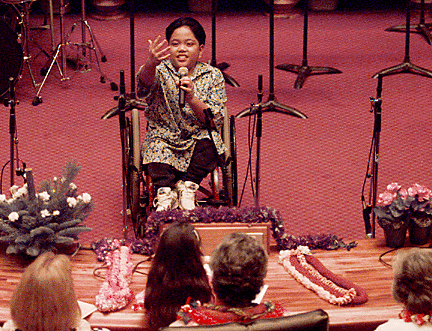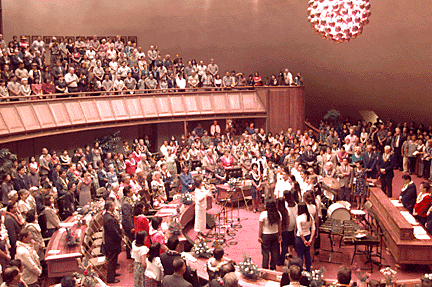


Legislature’s leaders
unveil ideas
Tax breaks for small business
and the hotel industry are proposedBy Mike Yuen Online directory to
legislators and their offices
Star-BulletinHoping to breathe new life into an ailing isle economy, Senate President Norman Mizuguchi proposed tax breaks for small businesses while new House Speaker Calvin Say recommended tax credits for the hotel industry, as they opened the 1999 Legislature today.
While Say left it to Majority Leader Ed Case (D, Manoa) to make the point, he was united with Mizuguchi in urging that residents receive tax credits to ease the cost of long-term health care for Hawaii's graying population.
Mizuguchi, a staunch ally of labor, also said public teachers, University of Hawaii faculty and blue-collar government workers should be prohibited from striking. Other public unions have already given up their right to picket in favor of binding arbitration.
"I believe that all citizens should have the right to uninterrupted government services," Mizuguchi said.
In offering their proposals, Mizuguchi and Say said they are heeding a strong message from the electorate for change and to do things better.
Their most daunting challenge is the economy, said Mizuguchi (D, Aiea) and Say (D, Palolo).
"All that we collectively desire for this state -- a good education, a safe community, a clean environment -- is made possible through economic activity," said Say, who peppered his speech with references to Burmese democracy leader Aung San Suu Kyi, Martin Luther King's "I Have a Dream" speech and the aloha spirit.
Say proposed the state offer a dollar-for-dollar tax credit for capital investments of $1 million or more that are used to renovate hotel rooms and facilities, a key element of the tourism industry, which drives Hawaii's economy. The credit would be applied to all state taxes due over a 10-year period.
While Say did not reveal a cost for his initiative, it appears to be much more expensive than a similar proposal Gov. Ben Cayetano successfully guided through the Legislature nearly two years ago.
Cayetano's hotel-renovation measure granted for two years a 4 percent tax credit that could not be more than 10 percent of the hotel room tax the hotelier paid the previous year. It was intended to boost Waikiki hotel bed space when the state convention center opened.
"Finally, with the recent opening of the convention center, the need exists to ensure that we have adequate quality hotel rooms to attract and accommodate conventioneers," Say said. "However, due to the city's development restrictions for Waikiki, there is virtually zero incentive for hotels to renovate their existing rooms. I believe the state can provide that incentive."
Mizuguchi said he wants to substantially lower the tax burden on small businesses -- by as much as $50 million -- through a program of tax incentives. "How best to structure these tax incentives and how long they should continue" is still being formulated, he said.

"Yes, some of these ideas are potentially costly and controversial," said Say. "However, they should not be tabled or dismissed for those reasons. In my humble opinion, these ideas represent the kind of bold and innovative thinking that our electorate expects from its leaders."Say also urged:
Mizuguchi hailed two economic initiatives pushed by the Senate in recent months: establishing Hawaii as the Asia-Pacific "call center" by offering product and service information on behalf of U.S. firms, and amending labor laws so Hawaii workers get their share of U.S. Defense Department construction jobs here.Development of a biotechnology research park in Kakaako which would spearhead what could be a $450 million industry by year 2000.
Establishment of a private-public partnership to develop the Marks Estate in Nuuanu as a wellness center.
Kick-starting plans to develop the site around the old Oahu Railway and Land Building, across Aala Park, with seed money to attract private partners who could also build low- and moderate-income housing.
Mizuguchi, whose foremost social concern has been long-term health care, said one alternative to Medicaid -- which has been a drain on federal and state budgets -- is long-term care insurance. But high cost has been a significant obstacle.
"Let us lower that barrier by making the purchase of private insurance more affordable," Mizuguchi said. "We can do that by offering tax credits to offset the cost of 50 percent of the annual premiums up to a specified limit. Thus, a policy that might ordinarily cost $2,000 a year would then actually cost $1,000."
Say did not make references to the controversial social initiatives Cayetano intends to introduce this session: domestic partnerships for gay couples, physician-assisted death and medical use of marijuana.
Mizuguchi did, but only to clarify his earlier remarks that the Senate will not get bogged down in divisive issues that detract from the main task at hand: revitalizing the economy, and other priorities.
There is always room for discussing highly charged issues, he said. "But it does mean that we should not be forced to act on an issue where there is little chance that a consensus can be obtained.
"In short, if we cannot find common ground and reach timely agreement, we must move on."
By Craig T. Kojima, Star-Bulletin
Speaker of the House Calvin Say took a look
around his new office yesterday, the day before
the opening of the 20th session of the Hawaii
state Legislature. This is the House leader's
first year as speaker. His office is in Room 431
of the state Capitol.
Highlights from opening-day speeches by the Legislature's leaders: First, Democratic majority leaders Senate President Norman Mizuguchi and House Speaker Calvin Say; then, the Republican leaders, Senate Minority Leader Whitney Anderson and House Minority Leader Barbara Marumoto. Speech highlights
Norman Mizuguchi
Broad theme: "To do things better and to make things right."
Proposals:
Provide $50 million in tax incentives for small businesses.
Establish state as Asia-Pacific's "call-center" hub.
Offer tax credits to offset 50 percent of the annual premium cost of long-term care.
Prohibit strikes by all state and county workers by using binding arbitration.
Launch pilot projects to advance early childhood development and education.
Impose school-by-school budgeting.
Improve accountability of the millions of dollars appropriated to aid special-needs students under the federally mandated consent decree.
Calvin Say
Broad theme: "We are prepared for controversy because avoiding change is not an option. We will embrace change and lead it."
Proposals:
Dollar-for-dollar tax credits for hotel room renovation projects of $1 million or more.
Develop a biotechnology research park in Kakaako under a public-private partnership.
Develop the Marks Estate in Nuuanu as a wellness center under a public-private partnership.
Jump-start development of the old Oahu Railway and Land Building across Aala Park by providing seed money to attract private partners.
Enact a law to allow the state to enter into agreements with private entities to develop transportation and environmental infrastructure.
Whitney Anderson
Broad theme: "It isn't going to be easy to turn things around."
Proposals:
Allow small businesses to obtain long-term, low-
cost leases on surplus state lands and unused agricultural tracts.
Provide tax breaks for small businesses.
Eliminate the Senate, make the Legislature a unicameral body.
Fund and staff the Office of the Legislative Analyst.
Issue vouchers so parents can chose where their children will be educated.
Offer teachers merit pay.
Hold a nonbinding referendum on whether to legalize gambling.
Barbara Marumoto
Broad theme: "They demand change; they demand action. That's the true message the voters sent us last fall."
Proposals:
Eliminate the excise tax on food, medical care and residential rent.
Simplify state taxes, making them a percentage of federal taxes.
Decentralize the statewide school board by creating school boards at the district level.
Adopt initiative, referendum and recall.
Elect the attorney general.
Privatize government services whenever possible.
Online directory to
legislators and their offices
Anderson: Go
By Mike Yuen
unicameral and
save a bundle
Star-BulletinSenate Minority Leader Whitney Anderson said today the state could save money by eliminating the Senate and having a unicameral Legislature.
"And if you don't really think that a 51-member unicameral Legislature will save dollars, just envision the entire second floor of this (Capitol) building completely empty - no senators, no staff, no phones, no faxes, no people running around. Completely empty. That's a whole lot of dollars."
Anderson (R, Kailua) in his opening-day speech, proposed tax breaks for small businesses, as did Senate President Norman Mizuguchi (D, Aiea). Anderson's proposal provided no specifics.
To further assist small businesses, Anderson would allow them to enter into long-term, low-cost leases on surplus state lands and unused agricultural tracts as a way to get around the high cost of lease rent, he said.
And he said education, the key to a productive isle work force, can be enhanced with merit pay for teachers and by offering vouchers so parents can chose where their children will be schooled.
In the House, Minority Leader Barbara Marumoto (R, Waialae Iki) urged her Democratic colleagues to look back to the fall election if the Legislature is to move forward in its search for solutions to the state's economic woes.
While Gov. Ben Cayetano, who narrowly won re-election, said the campaign was not about the economy but about values, Marumoto said it's about both.
"The two are not mutually exclusive. For it is our values which dictate how we deal with the challenges before us - economic or otherwise," said Marumoto, whose caucus is again pushing for elimination of the 4 percent general excise tax on food, medical care and residential rent.
She said she and her 11 Republican colleagues in the 51-member House will gladly unite with Democrats behind initiatives that are fair, honest, compassionate and nurturing, and that empower people instead of government.
"The most honest action we can take on this floor is to truly make government smaller and better," Marumoto added. "Mr. Speaker, we have to do it, and your Republican caucus will join with all others interested in finding the most humane, most practical and most effective ways to accomplish this necessary reduction."
A calendar of tomorrow's hearings -- to be held at the state Capitol, 415 S. Beretania St., unless noted: CAPITOL ROUNDUP
HOUSE
SENATEFinance: Briefings on the budgets of the departments of Defense and Taxation and the office of the attorney general, 9:30 a.m., Room 308. Briefing on the Department of Agriculture budget, 1:30 p.m., Room 308.
Ocean Recreation and Marine Resources: Briefings on the Department of Agriculture's budget for aquaculture financial assistance and development, and the Department of Land and Natural Resources' budget for commercial fisheries, aquaculture, aquatic resources and ocean-based recreation, 8:30 a.m., Room 312.
UPCOMINGGovernment Operations and Housing: Budget briefing on the Department of Business, Economic Development and Tourism, including rental housing and assistance services, housing finance and teacher housing, 1:30 p.m., Room 224.
Judiciary: Briefing on the 1999-2001 biennium budget, and 1999 legislative priority briefing for the Department of Public Safety and Hawaii Paroling Authority, 9 a.m., Room 229.
Ways and Means: Briefing on the Department of Transportation's airports, harbors, highways and related services, 8:30 a.m., Room 211. Briefings on Department of Human Resources Development support services, and Department of Commerce and Consumer Affairs services, including general support for consumer protection, insurance regulation and financial institution services, 1:30 p.m., Room 211.
Monday: Gov. Ben Cayetano's fifth State of the State speech before a joint session of the Legislature, 10 a.m., House chamber.